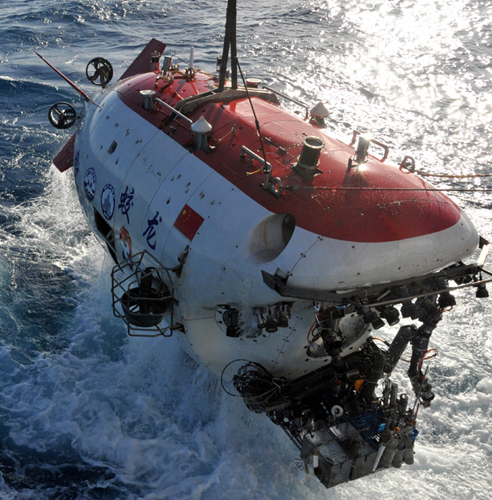China seeks cooperation with India for sea mining
By PENG YINING (China Daily) Updated: 2015-05-07 07:24Countries seen as 'ideal partners' because of similar development levels in ocean exploration
 |
|
China's deep-sea manned submersible Jiaolong is lifted out of water after an exploration mission, in the southwest Indian Ocean, Jan 10, 2015. [Photo/Xinhua] |
With quickening oceanic development and increasing mineral exploration in the Indian Ocean, China is eager to cooperate with India on deep seabed mining, according to the China Ocean Mineral Resource R&D Association.

"China and India are both developing countries and contractors with the International Seabed Authority, so we have a lot in common and plenty of opportunities for further cooperation," said He Zongyu, deputy director of the association.
The association is China's official organization engaged in exploration and development of ocean floor and subsoil.
Chen Lianzeng, deputy director of the State Oceanic Administration, visited India on April 20, and suggested the two countries enhance cooperation on oceanic research and development.
"If we cooperate, we could share the costs, the risks and the benefits," He said.
China and India are on about the same level in terms of the development of deep seabed mining, which makes India an ideal partner, He said.
Deep seabed mining is high-cost and high-risk work, with costs for a mining site topping 10 billion yuan ($1.6 billion), He said.
In 2011, China signed a contract with the ISA for a polymetallic sulfides exploration area of 10,000 square kilometers in the southwest Indian Ocean.
China also signed two contracts for exploration areas in the Pacific Ocean, but the rich findings in the Indian Ocean make this area a focus for China's future work.
China's deep-sea manned submersible Jiaolong finished a 118-day expedition in the Indian Ocean in March and discovered several new hydrothermal vents-deep-sea fissures that emit hot water. Its findings could help research into resources and environments of seafloor sulfide deposits that contain various metals.
During the vessel's latest mission, research vessel Dayang Yihao was also on a mission in the area. It was the first time China had its two major oceanic research facilities working in the Indian Ocean at the same time.
- Govt encourages people to work 4.5 days a week
- Action to be taken as HIV cases among students rise
- Debate grows over reproductive rights
- Country's first bishop ordained in 3 years
- China builds Tibetan Buddhism academy in Chengdu
- Authorities require reporting of HIV infections at schools
- Typhoon Soudelor kills 14 in East China
- Police crack down on overseas gambling site
- Debate over death penalty for child traffickers goes on
- Beijing to tighten mail security for war anniversary







